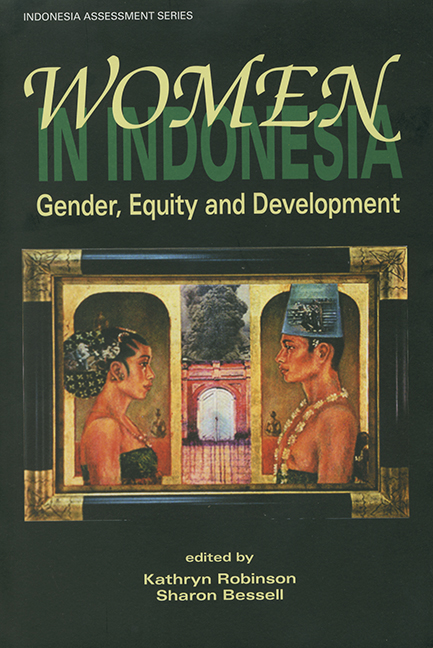Book contents
- Frontmatter
- Contents
- Tables
- Figures
- Contributors
- Acknowledgments
- Glossary
- Prologue
- 1 Introduction to the Issues
- 2 The Mega Factor in Indonesian Politics: A New President or a New Kind of Presidency?
- 3 The Downfall of President Abdurrahman Wahid: A Return to Authoritarianism?
- 4 The Year in Review: From Blind Man's Bluff to Mega Expectations
- 5 Further Comments on the Economy, with a Gender Perspective
- 6 Institution Building: An Effort to Improve Indonesian Women's Role and Status
- Commentary
- 7 Feminism in Indonesia in an International Context
- 8 Gay and Lesbi Subjectivities, National Belonging and the New Indonesia
- 9 And the Winner Is … Indonesian Women in Public Life
- 10 Indonesian Women Artists: Transcending Compliance
- 11 Literature, Mythology and Regime Change: Some Observations on Recent Indonesian Women's Writing
- 12 Women and the Labour Market during and after the Crisis
- 13 Women's International Labour Migration
- 14 Customary Institutions, Syariah Law and the Marginalisation of Indonesian Women
- 15 Women's Grassroots Movements in Indonesia: A Case Study of the PKK and Islamic Women's Organisations
- 16 Women's Activism against Violence in South Sulawesi
- 17 Gender Mainstreaming and Sex-disaggregated Data
- 18 The Changing Indonesian Household
- 19 Women, Family Planning and Decentralisation: New Variations on Old Themes
- 20 Men, Women and Community Development in East Nusa Tenggara
- References
- Index
- INDONESIA ASSESSMENT SERIES
9 - And the Winner Is … Indonesian Women in Public Life
Published online by Cambridge University Press: 21 October 2015
- Frontmatter
- Contents
- Tables
- Figures
- Contributors
- Acknowledgments
- Glossary
- Prologue
- 1 Introduction to the Issues
- 2 The Mega Factor in Indonesian Politics: A New President or a New Kind of Presidency?
- 3 The Downfall of President Abdurrahman Wahid: A Return to Authoritarianism?
- 4 The Year in Review: From Blind Man's Bluff to Mega Expectations
- 5 Further Comments on the Economy, with a Gender Perspective
- 6 Institution Building: An Effort to Improve Indonesian Women's Role and Status
- Commentary
- 7 Feminism in Indonesia in an International Context
- 8 Gay and Lesbi Subjectivities, National Belonging and the New Indonesia
- 9 And the Winner Is … Indonesian Women in Public Life
- 10 Indonesian Women Artists: Transcending Compliance
- 11 Literature, Mythology and Regime Change: Some Observations on Recent Indonesian Women's Writing
- 12 Women and the Labour Market during and after the Crisis
- 13 Women's International Labour Migration
- 14 Customary Institutions, Syariah Law and the Marginalisation of Indonesian Women
- 15 Women's Grassroots Movements in Indonesia: A Case Study of the PKK and Islamic Women's Organisations
- 16 Women's Activism against Violence in South Sulawesi
- 17 Gender Mainstreaming and Sex-disaggregated Data
- 18 The Changing Indonesian Household
- 19 Women, Family Planning and Decentralisation: New Variations on Old Themes
- 20 Men, Women and Community Development in East Nusa Tenggara
- References
- Index
- INDONESIA ASSESSMENT SERIES
Summary
This chapter examines women's political participation in Indonesia in the three years leading up to Megawati Sukarnoputri's presidency. In spite of the ‘wife and mother’ role assigned to them during the New Order period, women have become politically active in increasing numbers since the end of Soeharto's 32- year reign. The current period of political reform has seen the downfall of two further male presidents, B.J. Habibie and Abdurrahman Wahid.
INDONESIA'S FIRST WOMAN PRESIDENT
On 23 July 2001, Megawati Sukarnoputri became Indonesia's first woman president. This was just over two years after her party, the Indonesian Democratic Party of Struggle (PDI-P), won the first democratically held elections in more than four decades. Megawati's appointment came some 21 months after the ‘election’ of Abdurrahman Wahid, Indonesia's fourth president.
As Krishna Sen discusses in Chapter 2, at the time of Abdurrahman's election to the presidency in October 1999, Megawati's sex was used as an argument against her assuming the reins of government. Citing Islamic restrictions against a woman leader, powers in the People's Consultative Assembly (MPR) supported Abdurrahman – who had the advantage of being a man and the leader of an Islamic, if less popular, party (his National Awakening Party, the PKB, had gained 11 per cent of the vote at the 1999 general election). As Megawati was concerned to contain the violence that threatened to erupt at any minute, she graciously accepted the role of vice-president and requested that her supporters go home in peace.
Abdurrahman was heralded by the educated middle class, and especially by the international community, as a leader capable of bringing Indonesia into the fold of world democracies. But as the country was to learn, much to its disappointment, his expressed commitment to democracy would not be matched by his deeds. While one must recognise Abdurrahman's achievements in moving the nation towards greater freedom and democracy for the people (especially for minority ethnic groups), his erratic leadership, controversial statements and policy decisions, and personal drive to remain in power became increasingly hard to tolerate and threatened the overall political, economic and social stability of the country.
Megawati, on the other hand, rarely made public statements. This was particularly the case during the term of the Abdurrahman presidency, when her silence was often interpreted as a sign of weakness or a lack of capability.
- Type
- Chapter
- Information
- Women in IndonesiaGender, Equity and Development, pp. 100 - 112Publisher: ISEAS–Yusof Ishak InstitutePrint publication year: 2002



